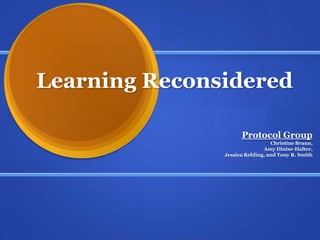
Learning Reconsidered Protocol Presentation
- 1. Learning Reconsidered Protocol Group Christine Braun, Amy Dinise-Halter, Jessica Rehling, and Tony R. Smith
- 2. Why Learning Reconsidered? Opening Video Refer to page 2 of Learning Reconsidered: Heading - Toward A New Understanding of Students and Learning
- 3. The Four A’s Break into groups 3-4 people per group 10 minutes for each question to follow. We will prompt you for time.
- 4. The Four A’s What Assumptions do the authors of the text hold? What do you Agree with in the text? What do you want to Argue with in the text? What parts of the text do you want to Aspire to?
- 5. The Four A’s What Assumptions do the authors of the text hold? What do you Agree with in the text? What do you want to Argue with in the text? What parts of the text do you want to Aspire to?
- 6. Bringing Us Back… Coming back together…
- 7. Putting Learning Reconsidered Into Practice… Learning Outcomes “Learning outcomes define the goals of learning experiences for students” Student should be able to “do, know or value” Not the same as student satisfaction Multiple Levels with Outcomes Look up, down and around Adapted from Keeling & Associates, 2007, Learning Reconsidered Institute.
- 8. Outcome-based Thinking From process-based thinking to outcome-based thinking Shift in attention from satisfaction to learning Shift from “just doing an activity” to defining what students will learning from the activity and why the activity is important to student learning Adapted from Keeling & Associates, 2007, Learning Reconsidered Institute.
- 9. Writing Learning Outcomes Characteristics of Good Learning Outcomes: Observable Measurable Assessment becomes key to defining and examining student learning Action-oriented According to Keeling and Associates learning outcomes should be: Very specific Practical Measurable Meaningful Consistent Sensible Credible Adapted from Keeling & Associates, 2007, Learning Reconsidered Institute.
- 10. Population Action Activity Measurement Learning Assessment Tool
- 11. Let’s Practice… Groups: Experiential Education High School to College Transitions Residential Life Leadership Development Transformative Learning
- 12. Let’s Process… What questions do you have? What are the implications to the field? To you?
- 13. What Amazing Opportunities Closing Video
- 14. References Bloom, B. S. (1956). Taxonomy of educational objectives, handbook I: The cognitive domain. New York, NY: David McKay. Keeling, R. P. (2007, June). From reconsidering learning to promoting student success: Creating institutional effectiveness [PowerPoint slides]. Retrieved from http://www.keelingassociates.com/ka/presentationsrecent. Kendal,P. L. (1994). The continuing education guide: The CEU and other professional development criteria. Lakeville, MN: Hunt. Retrieved June 18, 2007 from American Association of Law Libraries at http://www.aallnet.org/prodev/outcomes.asp.